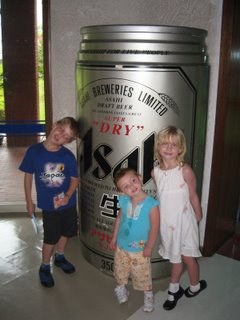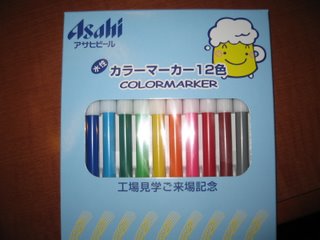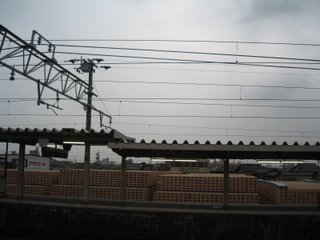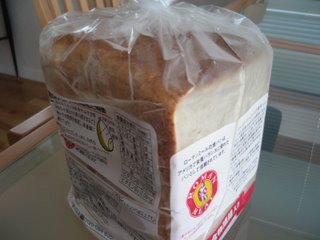
Greetings from Japan, where the local time is... tomorrow. (Yes, I stole that from The Simpsons, but I like it.)
* * *
We are tourists, more or less. So I heard about a tour. And as a tourist I felt it was my duty to go. It was the tour of the Asahi brewery here in Nagoya. The tour was all given in Japanese, but really, what could they say that I really needed to know about beer.

Mass production, big tanks, cans and bottles, hops, barley, blah blah blah. Got it. How long until the tasting room?
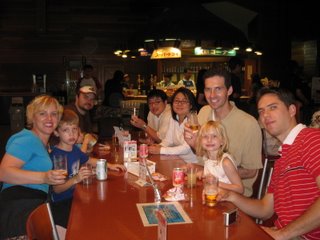
You might think that taking kids on a brewery tour is a bad idea. You might be right. But the nice people at Asahi are ready for kids. Right down to the coloring book and markers adorned with a cartoon beer mug! You know, for kids!
After our designated 20 minutes in the tasting room, it was back on the train back to town. Across from the tracks?... More beer cases than I have ever seen in one place.
* * *
* * *
* * *
The whole point of living somewhere strange and different and new is to get experiences that the typical tourist or business traveler wouldn’t get, right?
Like they say, be careful what you ask for.
Our car was towed last month. The Japanese typically park and double park wherever their car will fit along the roadside, and sometimes they park where their car won’t fit. We had heard, however, about a ‘crackdown’ where the police were contracting with 3rd party entities to do parking enforcement. I expected that it meant parking tickets. Yes, it does mean that.
We found out the hard way that it also means towing. Kathleen and the kids walked out of the train station to find the car missing. Knowing that it wasn’t stolen, she called me and told me it had been towed from what had been until then our favorite parking spot at the subway station.
So we have to go that night to the police station to get it back. The state of crime in Japan is that there were 5 policemen on duty there, and they could spare 2 of them to talk to us about our ticket. When I say “talk” I mean they took turns reading from a phrasebook explaining our infraction and the next steps.
The next steps included paying 14,000 yen (~$120) to them for the towing fee. Paying that fee got us a hand written receipt, duplicated using (get this) carbon paper. This is Japan, but at the police station it was Japan of 1962, I think. We paid our fine in cash, and the cash went into the same metal tackle-box that the receipt pad and carbon paper came out of. No cash register. No computer. Amazing.
You’d think that with the lack of crime, some of these on duty guys could tidy up the police station, which had papers and books strewn about like they were in the middle of a crime wave. And maybe they are. After all, there are all these foreigners just parking wherever they want.
I think the clutter is to give the image that they are busy. Never thought of a policeman and needing to prove his value to society, but over here I think they have to justify their existence.
I was trying to look at the bright side, and I started to think that the experience was almost worth the 14000 yen. Crazy police station. Carbon paper. Good blog fodder. I was just turning the corner, making lemonade out of it.
Then more lemons.
Paying for our infraction wasn’t over. We got a second bill for the parking ticket itself, which was another 15000yen ($130). Which oddly enough, couldn’t be paid for at the police station itself. (Maybe their carbon paper was worn out.) That one we had to take to the post office to pay. Which is pretty common over here. If you can’t do something at the post office or the convenience store, it can’t be done, I don't think.
* * *
"A crane lives 1,000 years, but a turtle lives 10,000." - Japanese Proverb
(Post script to the last proverb. To job your memory, the last proverb was
"Forgiving the unrepentant is like drawing pictures on water."
I thought about it, and decided that means it's literally a lost art.)
* * *


